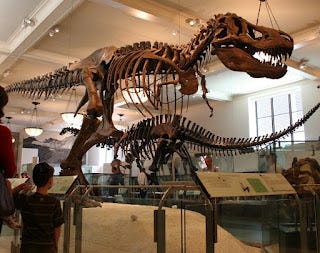"If Chazal Were Wrong About This..."
The comments section to a recent post was extensively visited by not just one but two special guest stars. One was Rabbi Dovid Kornreich of Toras Moshe, who honored me by writing a rather vicious blog against me for a decade which never missed an opportunity to interpret things I wrote in the worst possible light. The other was Rabbi Simcha Coffer of Toronto, who participated in another anti-Slifkin blog and famously once wrote that attending a scientific conference on evolution is worse than going to a brothel.

What caught the attention of these two legendary zealots? It was my post in which I described how those who refuse to acknowledge that Chazal were sometimes mistaken about the natural world suffer from a mistaken fear that if Chazal were mistaken, it would mean that they were foolish. Rabbis Kornreich and Coffer stressed that this is merely one reason. Another, more important one is the concern that if Chazal were wrong about spontaneous generation, then they could have been wrong about a lot of other things, too. Stating that the Gemara contains scientific errors opens the door for saying that it contains moral and halachic errors, especially regarding the nature and role of women. It could potentially lead to a complete undermining of the mesorah and a reform of Judaism.
(Note, by the way, that there is a fascinating admission here. Essentially they are admitting that their approach to conflicts between Chazal and science is intellectually dishonest, but that it is driven by the larger goals. At one point there is virtually an explicit admission of this, when one of them talks about "moving mountains" to avoid saying that the Gemara is scientifically incorrect.)
As it happens, I think that they are basically right.
Now, I personally do not believe that acknowledging Chazal's science to be obsolete leads to halachic change, since I am a strong adherent of the approach of Rav Herzog and others that canonizes Chazal's rulings. Still, I acknowledge that others may take a different approach. And though I personally am not at all convinced that we are any more morally or socially enlightened than Chazal, there are certainly those who think differently. And so I think it's clearly true that acknowledging Chazal to be mistaken on anything, even the spontaneous generation of salamanders, has the potential to lead to serious undermining of Judaism. Which is why I am certainly sympathetic to those who do not wish to make any such acknowledgment.
And yet they are wrong.
They are wrong for three reasons.
One is that there is a long tradition of great rabbinic authorities who did not feel that such concerns were sufficient to avoid acknowledging the obvious truth that some of Chazal's statements about the natural world are incorrect. From the Geonim, to Rambam and his son and other Rishonim, to Rav Shimshon Raphael Hirsch and Rav Herzog, to my own mentor Rav Aryeh Carmell ztz"l and many talmidei chachamim today, there have been countless important Torah scholars who were well aware of potential threats to Judaism and nevertheless felt that one should state the truth about Chazal's statements regarding scientific matters.

The second reason why they are wrong is that insisting that Chazal were never mistaken about science can also lead to serious undermining of Judaism. Because any intellectually honest person can see that it's just not true! When educated and honest people see ridiculous claims about there never having been an age of dinosaurs, or Chazal not having believed in spontaneous generation, or the egg-laying bat of the Gemara being an Australian platypus, they lose respect for contemporary representatives of Judaism. And when, as is all too often, the people issuing these absurdities insist that to believe otherwise is heresy, people simply see themselves as having no place in such an absurd religion.
The third reason why they are wrong is that they also undermine Chazal in other ways. For example, Chazal were absolutely clear that a baby born after seven months can survive (and hence one can break Shabbos to save its life), whereas a baby born after eight months cannot survive (and hence once cannot break Shabbos to save its life), which seems to have been based on various Greek ideas. But every single Orthodox Jew today would act otherwise. Now, they may dress it up with a (completely unconvincing) explanation that "nature has changed," but the bottom line is that saying "nature has changed" also opens the door for undermining Chazal. After all, if the nature of babies' lives can change, so can the nature of the female brain!
And there are even more basic areas where they undermine Chazal. Chazal and the Rishonim were perfectly clear about the value of being self-sufficient, the need for a man to take responsibility for supporting his family, and the importance of raising one's children to be able to support themselves. Nevertheless, charedi society has no problem completely undermining these values and directives. They will invoke such excuses as "Eis la'asos l'Hashem, heferu Torasecha (a time to act for God, overturn the Torah)," or "they could say it, we cannot," or simply not address it. But the bottom line is that they are undermining the classical mesorah and rendering it irrelevant. Mesorah becomes not what was done, but what we do.
Yes, life is complicated. And Torah is complicated. It can be difficult to promote reverence for an ancient tradition in a different world. But every approach has its advantages - and its drawbacks.
(On a completely different note - if you're coming to Israel for Pesach and can bring a suitcase of museum items from Teaneck, please let me know!)
(If you'd like to subscribe to this blog via email, use the form on the right of the page, or send me an email and I will add you.)


